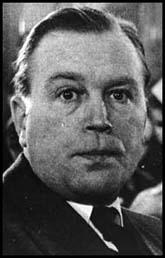Otto John

Otto John, the son of a civil servant, was born in Hesse, Germany in 1909. Educated as a lawyer John joined the Lufthansa legal department headed by Klaus Bonhoffer.
John joined the conspiracy against Adolf Hitler and after being transferred to the Lufthansa office in Madrid he made contact with British intelligence. After the failure of the July Plot he escaped to England where he worked for the BBC German Language Service.
After the war he returned to Germany where he was involved in classifying German leaders as pro and anti Nazis and the prosecution team at the Nuremberg War Trials. Later he was employed by the Federal Office for the Protection of the Constitution.
On 4th December, 1950, John was appointed head of Germany's new political secret service. John mysteriously disappeared on 20th July 1954. He was suspected of defecting to the Soviet Union but on 12th December, 1955, he returned to West Germany.
John claimed he had been kidnapped by the KGB but he was not believed and he was arrested and charged with treason. Sentenced to four years in prison he was released on 28th July 1958.
Otto John published his memoirs, Twice Through the Lines, in 1972.
Primary Sources
(1) Otto John, Twice Through the Lines (1972)
Roeder in his investigations used methods which we at the time used to call Gestapo methods. I knew that not only from what Frau Dohnanyi and Frau Muller told me after their release. He put them under great mental pressure by threatening to persecute their wives if they did not make statements. I also remember the notes smuggled out of prison by Dohnanyi stating that Roeder would stop at nothing to get his way.
Dohnanyi lived under constant threat that Roeder would hand him over to the Gestapo. I remember this very clearly because that would have led to Dohnanyi being tortured. None of us was under any illusion that subject to such appalling duress he might well be forced to make statements which could jeopardize the entire conspiracy against Hitler.
(2) Hugh Trevor-Roper, The Philby Affair (1968)
Late in 1942 my office had come to certain conclusions - which time proved to be correct - about the struggle between the Nazi Party and the German General Staff, as it was being fought out in the field of secret intelligence. The German Secret Service (the Abivehr) and its leader. Admiral Canaris, were suspected by the Party not only of inefficiency but of disloyalty, and attempts were being made by Himmler to oust the Admiral and to take over his whole organization. Admiral Canaris himself, at that time, was making repeated journeys to Spain and indicated a willingness to treat with us: he would even welcome a meeting with his opposite number, 'C'. These conclusions were duly formulated and the final document was submitted for security clearance to Philby. Philby absolutely forbade its circulation, insisting that it was 'mere speculation'.
He afterwards similarly suppressed, as 'unreliable', a report from an important German defector. Otto John, who informed us, in Lisbon, that a conspiracy was being hatched against Hitler. This also was perfectly true. The conspiracy was the Plot of 20 July 1944, and Canaris, for his contribution to it, afterwards suffered a traitor's death in Germany.
At the time we were baffled by Philby's intransigence, which would yield to no argument and which no argument was used to defend. From some members of Section Five, mere mindless blocking of intelligence was to be expected. But Philby, we said to ourselves, was an intelligent man: how could he behave thus in a matter so important? Had he too yielded to the genius of the place?
